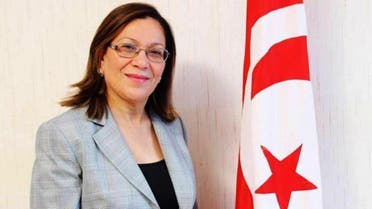Kalthoum Kannou, Tunisia’s first female presidential candidate
Judge Kalthoum Kannou has recently entered the history books as the first female presidential candidate in modern-day Tunisia
Not only was she among only three women to dare to practice their constitutional right in running for presidency, but Judge Kalthoum Kannou has recently made history as the first female presidential candidate in modern-day Tunisia, marking yet another milestone for the “cradle” of the Arab Spring country.
A judge in the Court of Cassation, the highest court in the Tunisian judiciary system chiefly responsible for verifying the interpretation of the law, Kannou is Tunisia’s first woman to seek a post higher than that of a parliamentarian.
Aiming to be the world’s first “Tunisian, Arab, Muslim, female president,” Kannou was able to garner more than 15,000 nominations from across the country while fielding her candidacy and is currently touring Tunisia for her electoral campaign competing against 24 men.
Born on the east coastal islands of Karkna in 1959, just three years after Tunisia’s independence from French colonial rule, Kannou grew up learning how to fight for her rights from her father, Mabrouk Kannou, a known member of the Tunisian General Labor Union who helped kick out the French.
Kannou earned a law degree from the Universite de Tunis in the capital to quickly become frontrunner in the battle for an independent judiciary and a fierce critic of corruption that marked the longstanding regime of Zine al-Abidine Ben Ali.
As a result of her outspokenness, the former Ben Ali government continuously used coercive measures to silence Kannou such as banning her from traveling, denying her promotions, cutting her salary, tapping her phone, and assigning her to courts in remote areas in the southern region although she spent most of her career in the capital.
Putting her 25-year career as a judge aside, Kannou is also a mother of three and is married to a physician.
The 2011 revolution that toppled the autocratic Ben Ali regime has witnessed the emergence of two ideological camps at odds – Islamism and secularism – that deeply divided both the Tunisian political system and society.
Wary of the political schism and its effect on the government’s efficiency and especially the judiciary system, Kannou continued to advocate for an independent judiciary as the president of the Association of Tunisian Magistrates (AMT).
But it wasn’t until the Islamist Ennahda party started calling for a “consensus president” as a political solution for Tunisia’s political deadlock in June this year that Kannou decided to step forward as a non-partisan, independent candidate and filed her candidacy in mid-July – a move that surprised many Tunisians.
“Her political independence is one of the things that qualify her for presidency,” said Ayoub Massoudi, a prominent blogger and former senior media advisor to President Moncef Marzouki.
“She is standing up to the political oneness and is going to play the role of the mediator between the polarizing forces,” added Massoudi, referring to the winners of the general elections: the secular Nidaa Tounes, which came out on top, and Ennahda, which won 69 of 217 seats.
“Kannou was above all the political bickering. And that’s what the Tunisian citizen needs.”
Tunisian intellectuals see her candidacy as “symbolic” and “historic” for a country already known as the Arab world’s most progressive in terms of women’s rights.
Gender studies academic and political writer Amel Grami told Al Arabiya News that Kannou’s candidacy is opening the door for future female candidacies.
“It is a symbolic move. She is sending a letter of hope for the coming generations saying that it is possible for the Tunisian woman to consider and seek this post,” Grami said.
“Kannou is an initiator. She is down on the streets leading her campaign and speaking to all kinds of people. She is on the media discussing politics and negotiating her views with others,” said Grami, adding that Kannou is breaking the “psychological barrier” that kept women from running for the highest presidency.
Speaking about whether Tunisian society is ready for a female president, prominent journalist Neziha Rejiba said: “The Tunisian man already trusts a female pilot with his life; goes to a female doctor for medical treatment and consults with a female lawyer for legal issues.”
“Why wouldn’t he trust a female president?”
But Kannou does not see herself as a representative of Tunisian women only.
“I am not a candidate for women. I am a candidate for all of Tunisia,” she said during an interview with Tunisian radio station Mosaique FM.
“I don’t think the other male candidates are running for presidency because they are men.”
Tunisians head to the ballot box again on Nov. 23.
-

Tunisia, France to cooperate on stopping jihadists
The measures will include strengthening border controls and increasing police and ... Middle East -

Tunisia Islamists make no presidential endorsement
The moderate Islamist Ennahda Party said it will not be endorsing a candidate in ... Africa -

A proper reading of Tunisia’s elections
Ennahda’s acceptance of the election results was a tactic and did not reflect on ... Middle East Opinion -

Attrition and recovery in Yemen, Iraq, Tunisia, Libya and Lebanon
One hopes that Yemen, Libya, and Syria do not descend into even bigger tragedies, ... Middle East Opinion -

Tunisia’s stark electoral lesson for Lebanon
Not only has it been without a president for several months, Lebanon also remains ... Middle East Opinion -

Long live Tunisia!
Those among us who still believe in the Arab Spring celebrated on Sunday a blessed ... Africa

